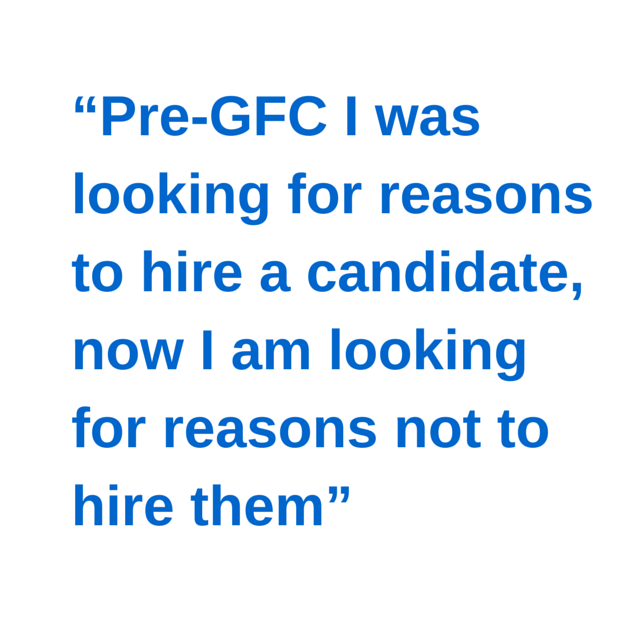Figures over the last 12 months point to a disturbing trend in Australia – Economic growth and rising unemployment. The figures are disturbing because it suggests that businesses no longer need to employ additional head count in order to grow.
“In 2007 I was looking for reasons to hire a candidate, now I am looking for reasons not to hire them”
This previously unseen dynamic is creating a highly competitive employment market in which applicants are being highly scrutinised. Hiring managers expectations are so high that only the top percentile of applicants are securing interviews. The interview process itself is becoming far more rigorous and as a result many candidates are finding it very difficult to secure their next role.
This highly competitive employment market is revealing an ever widening gap between the expectations of employers and prospective employees. From the data we are seeing the employment market will only become tougher over the next 5 years.
So what does this all mean for job seekers?
In an employer’s market companies can afford to be highly selective. As one client quoted –
“In 2007 I was looking for reasons to hire a candidate, now I am looking for reasons not to hire them”
The team at Q have identified 5 specific reasons why companies decide not to hire candidates. Our observations are based on hundreds of discussions with hiring managers, candidates, HR Directors and internal recruiters. Our insights contradict what generally is accepted as common practice interviewing and negotiation techniques.
The 5 key reasons employers decide not to hire
A focus on tasks not results
“I can see from the candidate’s background they can clearly do the job. But if they can’t tell me how they will get me results, why should I hire them?”
If you have made it to interview stage then the hiring manager is already confident that you can do the job. The interview isn’t as much to assess your level of technical ability but to assess your ability to get results. If during the interview you can’t demonstrate a track record in achieving results you won’t get hired. Recent results are what count (experiences pre-GFC will be heavily discounted) and anyone who can get results in recent economic downturns will stand out from the crowd.
Our network shares a common interview frustration, i.e. the example that comes with no end result. When asked to provide a specific case as to how a candidate has commercially supported their business, the response will often centre around a process improvement which then saved time.
Unfortunately the answer ends there when the interviewer is really interested in how the team was rationalised (saving FTE costs) or how the team got to spend more time identifying additional commercial opportunities (which resulted in additional revenue being generated).
As one client quoted – “I can see from the candidate’s background they can clearly do the job. But if they can’t tell me how they will get me results, why should I hire them?”
You just aren’t tough enough!
Resilience, admitting and learning from failures and the courage to make tough decisions are now viewed as the essential characteristics required when it comes to getting results in tough economic times.
You are telling the interviewer what you think they want to hear
More of our clients are confessing that competency based interviews do have some flaws. One being that many candidates have figured out how to navigate the questions successfully. Several clients have shared personal experiences of applicants impressing with their answers and then not living up to expectations once in the job.
Applicants have many resources to help them ‘Ace’ an interview. There’s lots of free advice on the internet, Linked In and coaching from outplacement firms. Some candidates are paying for ‘professional’ resume writing services and specialist interview coaching.
We would advise applicants to be wary of the advice they follow as interview processes are now being designed to identify rehearsed answers.
During future interviews expect an increasing focus on failures rather than successes. Interviewers are more interested in how you deal with adversity than success. This fresh approach forces candidates to really think about their answers.
We have received positive feedback from clients when candidates have been authentic in their answers and in most cases it has contributed to them being offered the job. In contrast, candidates using rehearsed answers generally come across as lacking self awareness, the ability to analyse weaknesses and learn from mistakes.
Companies don’t need to hire you
Many companies now have mandates to promote internal talent pools, this can lead to external applicants being used as a ‘benchmark’ for an internal process.
Increasingly we are noticing clients will not hire unless they believe that they have absolutely the right person for the job. Interview processes will often go on for months whilst the hiring manager considers every option. This trend is not exclusive to executive roles as manager level recruitment processes can take just as long.
Over the past 5 years businesses have become far more efficient, comfortably sharing workload amongst the team whilst they hire. Outsourcing, offshoring and rapid advancements in technology have provided companies with multiple solutions to resourcing needs. This means that businesses may decide not to hire at all.
Many companies now have mandates to promote internal talent pools, this can lead to external applicants being used as a ‘benchmark’ for an internal process.
Your actions are not congruent with who you claim to be
increasingly we are finding that clients will retract offers if intuition is telling them not to hire a candidate
When we asked our clients what they base most of their hiring decision on, almost all of them answered gut feel or intuition. And increasingly we are finding that clients will retract offers if intuition is telling them not to hire a candidate. Whilst this may seem harsh, in many instances the candidate (more specifically the candidate’s behavior) has been the catalyst for the client’s decision.
What we all often put down to gut-feel is perhaps a lack of congruency relating to actions of a candidate and the claims they have made throughout the selection process.
Identifying incongruences’ begins with the review of a resume. Make sure that what you put on your resume is fact and can be substantiated. If you claim to have “fantastic” attention to detail, you must ensure there are no mistakes in the resume.
If you have a Linked in profile make sure it matches your resume. We live in a society where there is nowhere to hide. So if you decide to explain a gap in the resume as ‘travelling’ (when it was actually a career move gone wrong) you will get found out. It is best to be open as to why the move didn’t work out and share what you have learned from the experience.
During the interview you are being assessed from the moment you walk through the door. If you claim to be a great stakeholder manager but don’t engage the interviewers you won’t get the job. If you claim to be calm under pressure and then fluff the psyche test you won’t get the job.
If you are going through a process via a recruiter ensure you behave with them as you would do with any prospective employer. Good recruiters are given trusted advisor status with clients and have a vested interest in helping clients hire the right person. If your behaviour towards a recruiter is not professional and courteous then this will filter back to the client. Remember the role of a recruiter is to find their client the best person for the job, company and culture too.
Here are a few scenarios where specific candidate behavior can ultimately ruin any chance of being hired.
Providing a resume that contains only your recent experience
Candidate’s perception – Companies are only interested in the last 10 years of experience
Client’s perception –
- Applicant has a shady past and is trying to hide it
- Applicant is lying about their experience
- Applicant is too lazy to provide me with a detailed resume why should I bother interviewing them
- Applicant is a lot older than they want me to think they are and are trying to fool me. If I interview them and don’t hire them will I then be accused of discriminating on age?
Turning up late for interview.
Candidate’s perception – My apology has been accepted, it’s ok.
Client’s perception –
- Applicant can’t meet deadlines
- Applicant has poor planning skills
- Applicant is disrespectful of my time
Renegotiating terms after accepting an offer.
Candidate’s perception – I’m only asking for another $5,000, if they really want me then it shouldn’t be a problem
Client’s perception –
- Applicant is displaying bullying behavior
- Applicant is holding me to ransom
- Applicant does not hold value in keeping ones word or delivering on promises
Withholding information that could impact your ability to meet the demands of the job until offer stage
Candidate’s perception – If I share this information with the company now then it may ruin my chances of being offered the job. If I wait until I’m offered then I might have more bargaining power
Client’s perception –
- Applicant showing a lack of transparency, I have genuine concerns that critical information will be with held in the work place
- Applicant is displaying a fear of confrontation
- Applicant is not trustworthy
The best advice we can give anyone going for interview has not changed if the last 20 years, that is ‘Just be yourself’.
In our next blog we will share with you our 5 top tips to guide you successfully through the interview process. No tricks, no gimmicks just some honest and direct advice.

